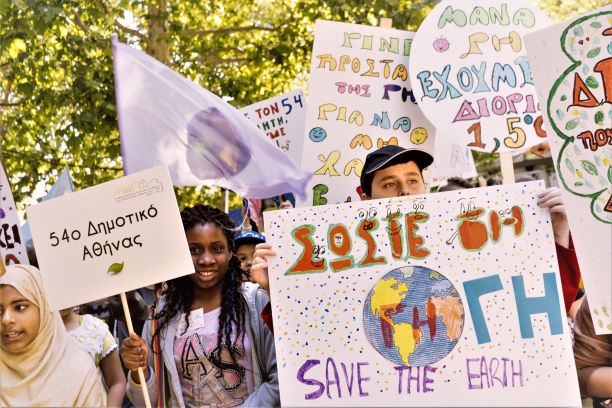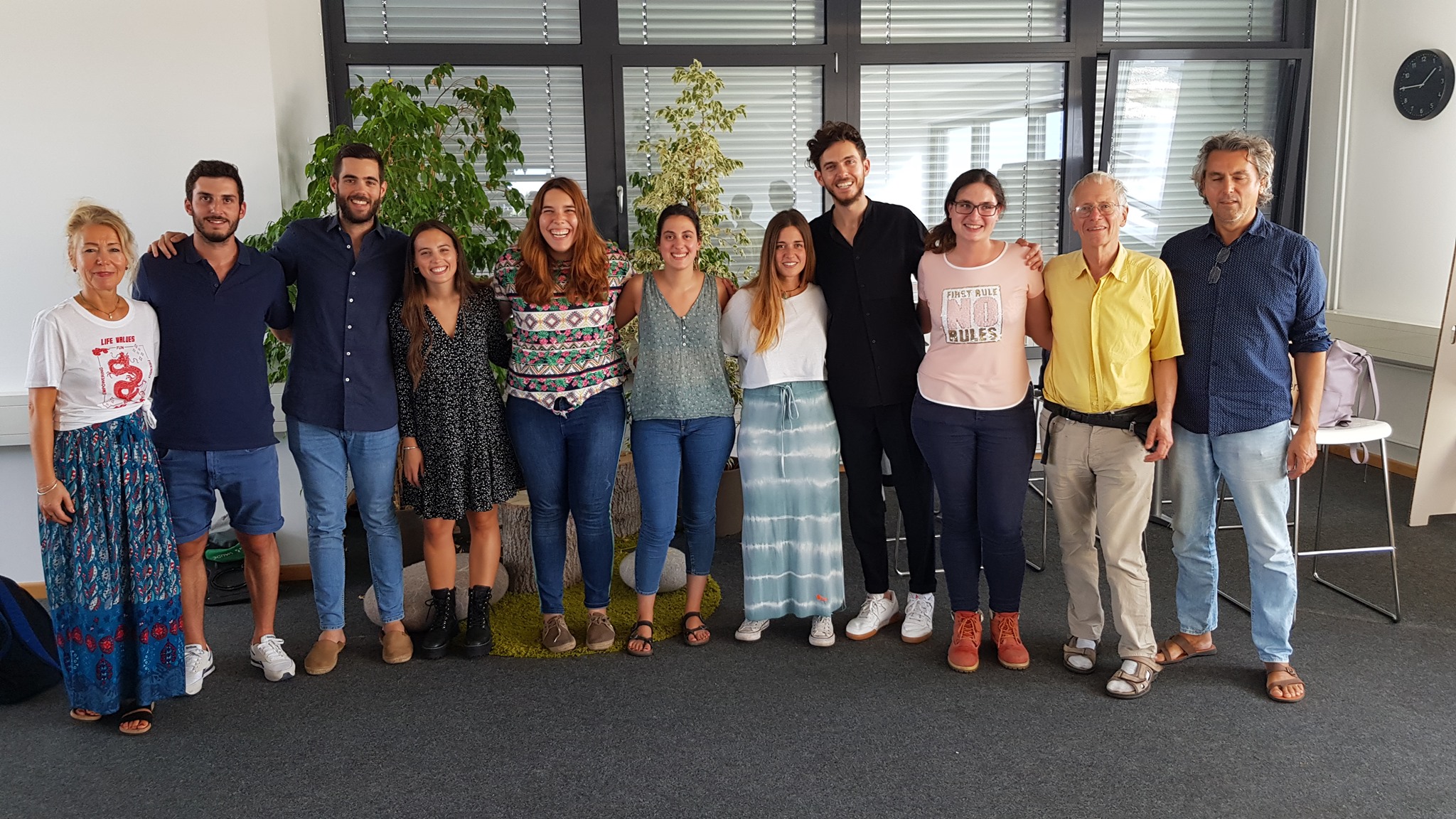
4 young people from Greece and 4 young people from Spain visit Berlin for 15 days to study good examples of energy saving in buildings and to be trained in natural cooling and heating techniques as well as applying renewable energy in buildings
The visit to Berlin took place in the framework of the program “YESClima: Youth work for the climate protection and energy saving”, 17/08/2019 to 31/08/2019 with the aim of educating the young people from Greece and Spain on energy and saving issues. The Greek team started the “energy” trip to Berlin where it had the ability to attend at seminars in combination with visits and return back to Athens with full of knowledge for the next months in order to be able to work for climate protection as well as for energy efficiency and renewable energy in buildings.
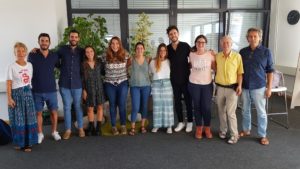
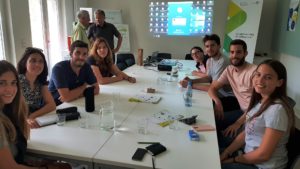
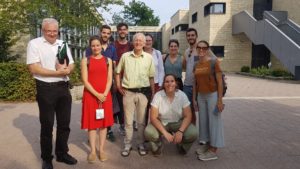
About the project YESClima
The objective of our project YESClima is to train young energy experts to carry out energy audits in primary schools, providing advice to the municipalities involved in the project. With their practice and additional training, our goal is to increase their chances of working.
Project Partners:
University of Cádiz / Universidad de Cádiz (UCA) (leader), Anemos Ananeosis / Wind of Renewal, Energía y Sostenibilidad Provincia de Cádiz – Energy Agency of Cadiz (APEC), Fundación Medio Ambiente, Sekretariat für Zukunftsstudien Berlin an der Freien Universität Berlin – Secretariat for future studies Berlin at the Free University Berlin (SFZ).
The project has the following goals:
1. to improve the indoor climate and thermal comfort for teachers and pupils.
2. to provide energy savings in the heating and cooling of buildings, and thus also economic savings for the local authorities that manage the schools, thereby reducing CO2 emissions from the schools.
3. to increase awareness among the communities involved, especially in the schools themselves, of the urgent need to save energy and to generate it in a more environmentally friendly way.
4. to step up efforts to train unemployed young people and provide secure jobs working on the transformation towards a climate-friendly energy system.They will be trained in comprehensive energy audits, including economic aspects and, in particular, how to design, size and evaluate passive conditioning techniques in schools.
This project is part of the European Climate Initiative (EUKI) of the German Federal Ministry for the Environment, Nature Conservation and Nuclear Safety (BMU). It is the overarching goal of the EUKI to foster climate cooperation within the European Union (EU) in order to mitigate greenhouse gas emissions.
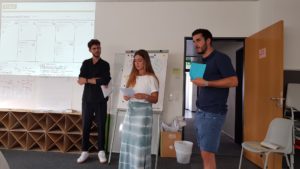
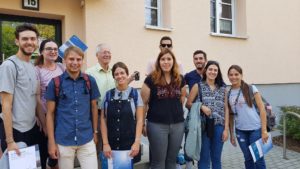
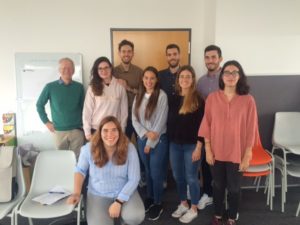
2d study visit to Berlin
The Greek team started the “energy” trip to Berlin where it had the ability to attend at seminars in combination with visits and return back to Athens with full of knowledge for the next months.
At the first day, took place a meeting with Mr. Hartwig Berger who presented to the team the climate crisis of today and that it is urgent to act now for climate protection. They talked about the global warming and the global temperature that is rising. At 2 degrees Celsius it will be inevitable to affect climate crisis. After that, they spoke about the “energy communities” and their role in our societies, as an example schools could produce more energy than they need so they could be the energy producers of a whole neighborhood.
- The first visit consisted of a talk about natural techniques of cooling at the building of the Institute of Physics in Berlin/Adlershof. The growing issue of draught as forests are getting dryer as well as lakes and rivers are losing their water amounts was pointed out. The existence of low quality water was also pinpointed. The team was informed about the fact that 80% of precipitation is converted to evaporation. One important point was that almost all rain comes from the small water cycle. Specifically, at the Institute of Physics it was mentioned that 5cm water is needed at the roof top bottom. Each building is surrounded by 947 plants useful both for cooling and shading. Another way of building cooling systems mentioned was evaporative rainwater-based exhaust air cooling. It was suggested also to reuse all types of water, such as rainwater and greywater. But attention should be put on legionella in these types of water and probably use of UV radiation to avoid possible infections.
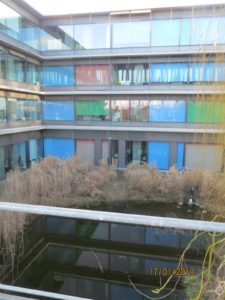
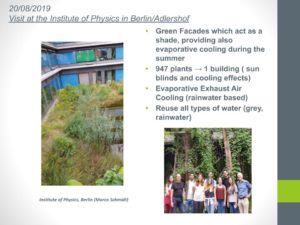
- Visit at a nursery in renovation which will be cooled without any emission by combining natural techniques of ventilation with intelligent shading. There was a glass roof, while also 14 ventilators were used for air exchange.
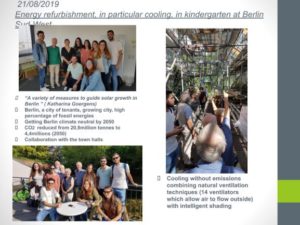
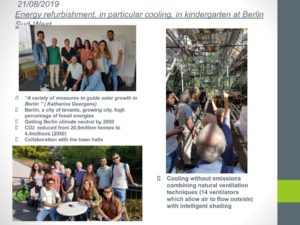
-
Visit at Peetzig village, 2 hours outside Berlin. There was a house where some operations were taking place for insulation of the outside of the building with natural materials such as straw and loam. Help was offered to them to build the insulation system. Afterwards, there was a visit to the farm of the property where there were some ecological practices such as composting, use of the outside toilet without using water but straw etc.
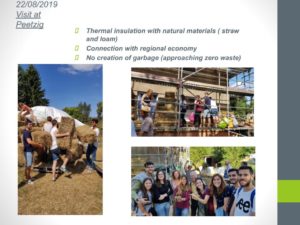
-
Visit to the nonprofit organization Ufa Fabrik, which is a multifaceted area offering infrastructure for many activities, like hostel, restaurants, cafes and bakeries. The most important is that there is a place with many eco-friendly functions. Specifically, it uses photovoltaics to save energy in combination with green roofs for the natural cooling of buildings. In addition, it collects the rainwater for minor uses, such as flash toilet.
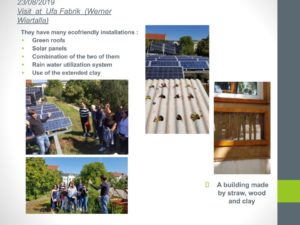
- Visit at the Parliament of Berlin where a lecture was held by Stefan Taschner, a member of the Green Party, on the policies pursued to save energy and especially on the management of electricity and the strategies for phase out of lignite by 2020, carbon by 2030 and zero emmissions of CO2 by 2050.
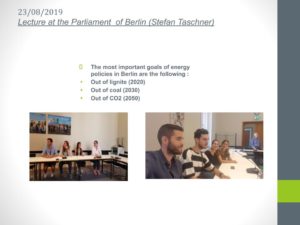
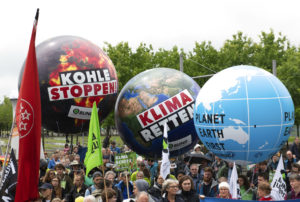
- A visit to the building of the german newspaper TAZ. It’s a good example of how to heat and cool a new building only using the energy produced from the inside. Specifically, it has an adiabatic cooling system, an energy recovery system for heating and a green roof. Meanwhile, the offices have sound insulation and also there is control of the quality of air. It’s worthwhile to note that there is only use of tap water and not rainwater because of the bacteria Legionella.
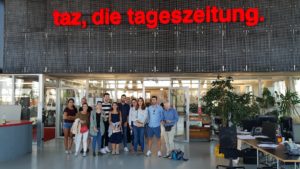
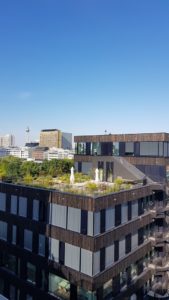
- The MärkischeScholle is a cooperative apartment association where tenants have shares of the association as long as they rent apartments. There is a heating system for every 4 buildings, heating is stored under 3 layers and there is insulation on tops and laterals of the buildings. Solar panels are used for heating water and storaging the heat. Adiabatic heating is used. The apartments have simple independent built-in air regulation system. Energy is used from both solar panels and Berlin grid. 80% of the energy for heating is provided by solar and geothermal systems.
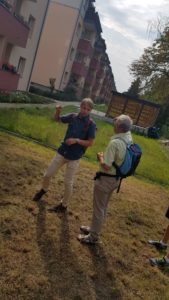
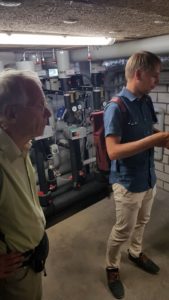
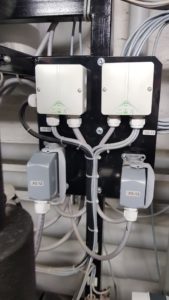
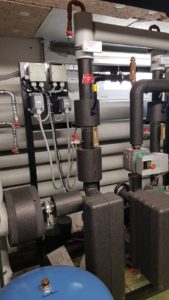
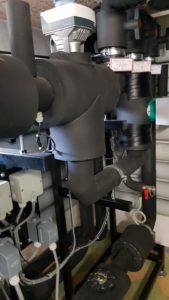
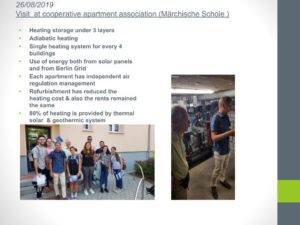
-
At the Free University of Berlin, since 2002 exists a “Unit for Sustainability and Energy Management” and the goal for the university is to become climate neutral by 2025. Furthermore, energy management will be maintained by permanent staff and volunteer users. A non-destructive intrusion to the current energy provision system is decided. A ‘green’ IT program for the monitoring of the energy consumption is also introduced at FU as well as a “bonus system” for the departments. Specifically, the data from the university show:
a) 26% energy consumption decrease within the decade 2001-2011,
b) 99% reduction in heating oil usage (affecting total heat consumption),
c) 81% reduction of CO2 emissions in electricity (due to ‘inhouse’ energy production due to photovoltaics; which affects the total CO2 emissions).
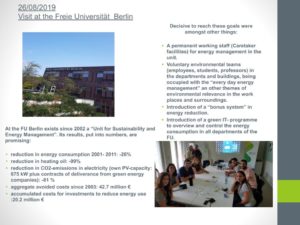
- Visit at Low energy primary schoolHohenneudorf – Niederheide. It is a green school, with smart shade and ventilation systems, green facades and solar panels at the roof. Every classroom had its own room for wardrobe and bathroom where the ventilation was taking place through air pipes from the classrooms.
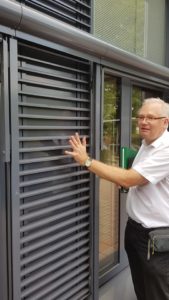
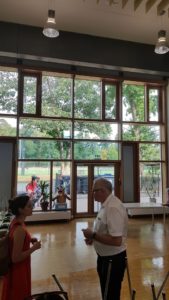
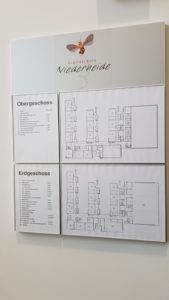
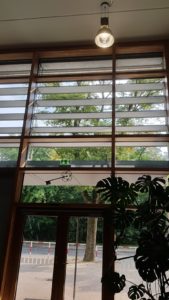
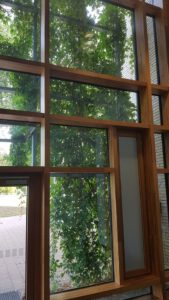
-
The last 3 days of the program included a workshop by FIAP e.V. Introduction to the design and management of educational and professional biographies. Interviews between the Greek and Spanish teams also took place. Creating responsible ‘green’ entrepreneurship has been proposed and developed. On the last day, mixed Greek-Spanish teams presented 2 business proposals using the business model ‘canvas’ to compost restaurants’ waste and to exploit rainwater to generate electricity.
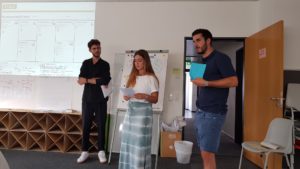
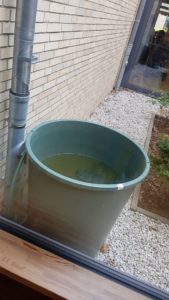
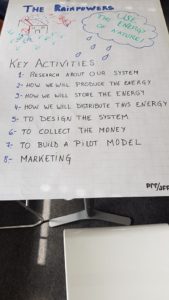
About the team
The second greek team of 4 young people who are being trained in energy saving issues, being Iro Maria Antoniou (Physicist and MSc Microelectronic Engineer), Marianna Basoulou (Graduated from the department of Forestry and Management of Environment and Natural Recourses DUTH (Integrated Master)), Antonios Papadopoulos (Mechanical Engineer & MSc Environmentalist), Zacharoula Piralisvili (Philosophy and Social Studies, M.A. International and European Studies).
During the implementation of the project energy audits will be carried out in schools – that have been selected – jointly with students and teachers on the basis of a participatory methodology developed under the EUKI “Climate Schools Be.Ath“ project, in which Wind of Renewal is a partner. The energy audits will be carried out by the four trainees in collaboration with the educational communities of the schools. Following the audits, low, medium and high cost proposals for the energy upgrade of schools, will be drafted.
Wind of Renewal cooperates with the MUnicipalities of Agios Dimitrios, Kaisariani and Vrilissia where the energy audits and the proposals will be implemented with the goal of Zero Emissions Buildings (schools)
